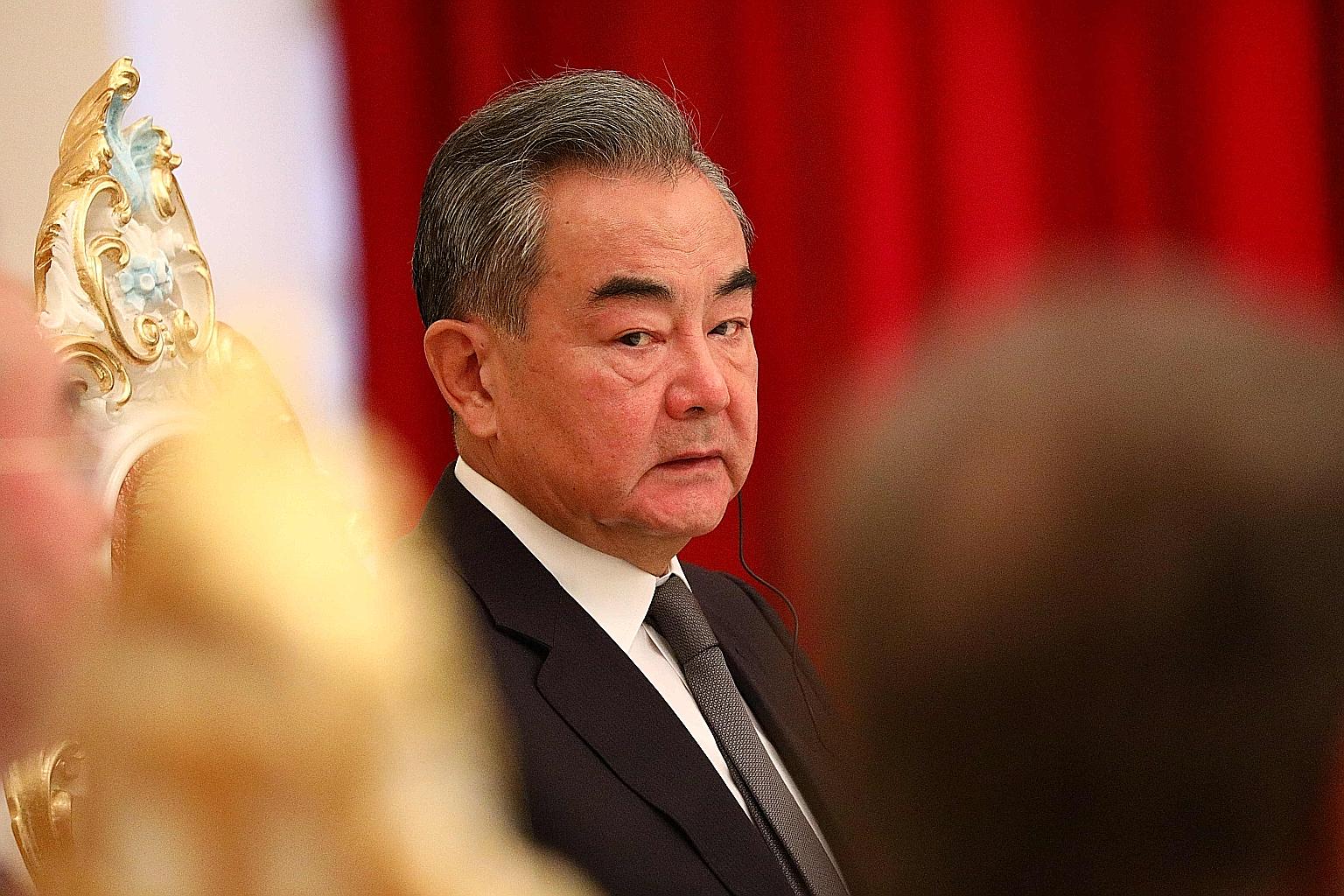Beijing embraces high-stakes ties with Taleban as Washington exits
Move tied to China's rise as global power and fears over extremism spilling over from Afghanistan
Sign up now: Get ST's newsletters delivered to your inbox

Chinese Foreign Minister Wang Yi's endorsement of the Taleban's "important role" in governing Afghanistan has provided a vital boost of legitimacy for a group that has long been a global pariah.
PHOTO: AGENCE FRANCE-PRESSE
Follow topic:
BEIJING • When the Taleban first took over Afghanistan in 1996, China refused to recognise the group's rule and left its embassy shut for years. This time around, Beijing is among the first to embrace the Islamist militants next door.
China's remarkable shift was on display little more than two weeks ago, when Foreign Minister Wang Yi welcomed a Taleban delegation to Tianjin as the group made gains against Afghan President Ashraf Ghani's administration.
Mr Wang's endorsement of the Taleban's "important role" in governing Afghanistan provided a crucial boost of legitimacy for a group that has long been a global pariah due to its support of terrorism and repression of women.
Beijing's reasons have as much to do with its own rise as a global power as the Taleban's surprisingly swift march on Kabul, the Afghan capital.
China today commands a US$14.7 trillion (S$20 trillion) economy - more than 17 times its size in 1996 - and a massive trade-and-infrastructure initiative that stretches across the Eurasian land mass.
Beijing's fears about Islamist extremism among its own Uighur minority have also deepened in recent years.
Moreover, an increasingly intense rivalry with the United States has prompted Beijing to seize any opportunity to push back against Washington's dominance.
Those interests make China look like the next great power with a stake in bringing order to Afghanistan.
"Twenty years ago, China wasn't a global power," said Ms Yun Sun, director of the China Programme at the US-based Stimson Centre.
"Today, there are so many new factors - there's the Uighur issue, there's economic interests and China's self-perception as a global power."
China has sought to portray itself as more pragmatic and less interventionist than the West.
Chinese Foreign Ministry spokesman Hua Chunying said on Monday: "China hopes the Afghan Taleban can unite with other political parties and with all ethnic groups, and build a political framework in keeping with national conditions that is broadly inclusive and will lay the foundation for enduring peace."
Still, she stopped short of endorsing the Taleban's rule.
Washington had left "an awful mess of unrest, division and broken families" in Afghanistan, Ms Hua said yesterday. "America's strength and role is destruction, not construction."
Mr Wang told US Secretary of State Antony Blinken that the turmoil highlighted the danger of trying to impose a political system on a foreign culture.
The Chinese state media gloated over the American withdrawal, with a Xinhua commentary declaring it the "death knell for declining US hegemony".
Even so, China is one of the few countries that saw some benefit from the United States' US$840 billion nation-building debacle, which bogged down Beijing's rivals while creating a relatively stable environment for its firms.
Afghanistan's stability is key to protecting more than US$50 billion worth of Belt and Road projects in neighbouring Pakistan that provide an overland route to the Indian Ocean.
But perhaps no issue is as pressing for Beijing as ensuring that Afghanistan does not become a source of extremism that bleeds over the border.
Ms Hua urged the new regime to "prevent Afghanistan from becoming a gathering place for terrorists and extremists again".
The top-level Taleban delegation that met Mr Wang in Tianjin last month had promised that Afghanistan would not be used as a base for militants.
In exchange, China offered economic support and investment for the country's reconstruction.
Professor Fan Hongda from the Shanghai International Studies University said: "China's attitude towards a Taleban-led regime will depend on its policies, for instance, whether the Taleban will honour its promises and not become a hotbed for extreme forces that have links to China."
Afghanistan could become the biggest test yet of a Chinese diplomatic model that is driven by loans and infrastructure deals rather than demands for liberal policies.
"The Chinese approach is, 'Through economic infusion we create roads, we create infrastructure, and we make sure everyone has jobs,'" said Stimson Centre's Ms Sun. "And if everyone goes to work at nine in the morning and comes home at 6pm, they don't have time to think about terrorism."
BLOOMBERG, REUTERS

